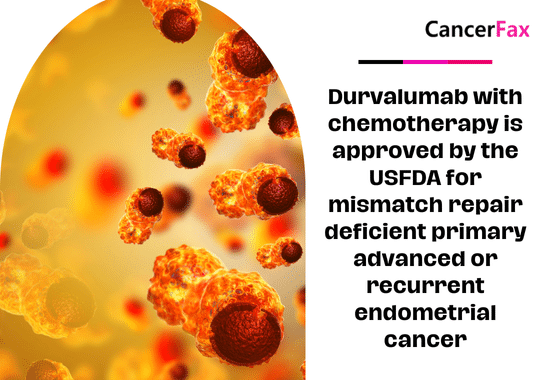Durvalumab with chemotherapy is approved by the USFDA for mismatch repair deficient primary advanced or recurrent endometrial cancer
June 2024: The Food and Drug Administration has granted approval for the use of durvalumab (Imfinzi, AstraZeneca UK Limited) in combination with carboplatin and paclitaxel, followed by single-agent durvalumab, for the treatment of adult patients with primary, advanced, or recurrent endometrial cancer that has a deficiency in mismatch repair (dMMR).
The effectiveness of the treatment was assessed in the DUO-E (NCT04269200) study, which was a randomized, multicenter, double-blind, placebo-controlled trial involving patients with primary, advanced, or recurrent endometrial cancer. The tumor’s MMR status was used as a criteria for categorization and was determined using an immunohistochemical test on the tumor tissue. Patients were assigned randomly, in equal proportions (1:1:1) to one of the following therapy groups:
The treatment regimen consists of administering Durvalumab at a dosage of 1,120 mg along with carboplatin and paclitaxel. This treatment is given every 3 weeks, with a maximum duration of 6 cycles. After finishing chemotherapy, patients were administered durvalumab at a dosage of 1,500 mg every 4 weeks as a maintenance treatment until the disease progressed.
Administer a placebo along with carboplatin and paclitaxel every 3 weeks for a maximum of 6 cycles. After finishing chemotherapy, patients were given a placebo every 4 weeks until their condition got worse. A supplementary experimental combo regimen. The investigator’s assessment using RECIST v1.1 evaluated progression-free survival (PFS), which was the primary indicator of effectiveness.
When carboplatin and paclitaxel were combined with durvalumab, progression-free survival (PFS) was significantly higher in the general population compared to when carboplatin and paclitaxel were used alone. However, this improvement was mostly seen in patients with dMMR tumors. This conclusion was drawn from an exploratory analysis that examined the relationship between tumor MMR status and treatment outcomes.
The middle point of progression-free survival (PFS) for the durvalumab group of 95 patients with dMMR tumors was not found (NR), and the 95% confidence interval (CI) was NR to NR. In the placebo group, the median PFS was 7 months, with a 95% CI of 6.7 to 14.8. The hazard ratio was 0.42 (95% CI: 0.22 to 0.80). Overall survival, which is an additional measure of effectiveness, was not yet fully developed at the time of the progression-free survival analysis.
When durvalumab is given with carboplatin and paclitaxel, the most common side effects (>25%) are peripheral neuropathy, musculoskeletal pain, nausea, alopecia, fatigue, abdominal pain, constipation, rash, diarrhea, vomiting, and cough. The prescribing information contains a comprehensive list of all adverse effects.
The prescribed dosage of durvalumab for patients weighing 30 kg or more is 1,120 mg, to be administered alongside carboplatin and paclitaxel every 3 weeks for a total of 6 cycles. This should be followed by a single dose of durvalumab of 1,500 mg every 4 weeks. The prescribed dosage of durvalumab for patients weighing less than 30 kg is 15 mg/kg, administered alongside carboplatin and paclitaxel every 3 weeks for a total of 6 cycles. A dosage of durvalumab at 20 mg/kg every 4 weeks follows this.
Susan Hau is a distinguished researcher in the field of cancer cell therapy, with a particular focus on T cell-based approaches and cancer vaccines. Her work spans several innovative treatment modalities, including CAR T-cell therapy, TIL (Tumor-Infiltrating Lymphocyte) therapy, and NK (Natural Killer) cell therapy.
Hau's expertise lies in cancer cell biology, where she has made significant contributions to understanding the complex interactions between immune cells and tumors.
Her research aims to enhance the efficacy of immunotherapies by manipulating the tumor microenvironment and exploring novel ways to activate and direct immune responses against cancer cells.
Throughout her career, Hau has collaborated with leading professors and researchers in the field of cancer treatment, both in the United States and China.
These international experiences have broadened her perspective and contributed to her innovative approach to cancer therapy development.
Hau's work is particularly focused on addressing the challenges of treating advanced and metastatic cancers. She has been involved in clinical trials evaluating the safety and efficacy of various immunotherapy approaches, including the promising Gamma Delta T cell therapy.
- Comments Closed
- June 22nd, 2024






Advanced/recurrent endometrial cancer, dMMR endometrial treatment, Durvalumab endometrial cancer, FDA-approved immunotherapy 2023, Imfinzi chemotherapy approval, Mismatch repair-deficient therapy, PD-L1 inhibitor for uterine cancer, Precision oncology for gynecologic cancers
CancerFax is the most trusted online platform dedicated to connecting individuals facing advanced-stage cancer with groundbreaking cell therapies.
Send your medical reports and get a free analysis.
🌟 Join us in the fight against cancer! 🌟
Привет,
CancerFax — это самая надежная онлайн-платформа, призванная предоставить людям, столкнувшимся с раком на поздних стадиях, доступ к революционным клеточным методам лечения.
Отправьте свои медицинские заключения и получите бесплатный анализ.
🌟 Присоединяйтесь к нам в борьбе с раком! 🌟